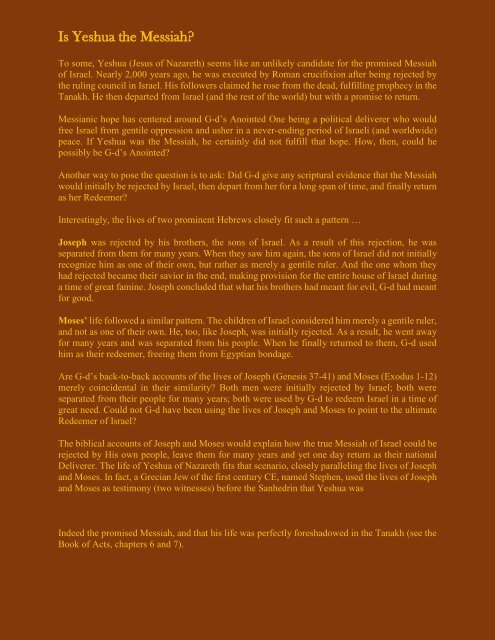Create successful ePaper yourself
Turn your PDF publications into a flip-book with our unique Google optimized e-Paper software.
Is Yeshua the Messiah?<br />
To some, Yeshua (Jesus of Nazareth) seems like an unlikely candidate for the prom<strong>is</strong>ed Messiah<br />
of Israel. Nearly 2,000 years ago, he was executed by Roman crucifixion after being rejected by<br />
the ruling council in Israel. H<strong>is</strong> followers claimed he rose from the dead, fulfilling prophecy in the<br />
Tanakh. He then departed from Israel (and the rest of the world) but with a prom<strong>is</strong>e to return.<br />
<strong>Messianic</strong> hope has centered around G-d’s Anointed One being a political deliverer who would<br />
free Israel from gentile oppression and usher in a never-ending period of Israeli (and worldwide)<br />
peace. If Yeshua was the Messiah, he certainly did not fulfill that hope. How, then, could he<br />
possibly be G-d’s Anointed?<br />
Another way to pose the question <strong>is</strong> to ask: Did G-d give any scriptural evidence that the Messiah<br />
would initially be rejected by Israel, then depart from her for a long span of time, and finally return<br />
as her Redeemer?<br />
Interestingly, the lives of two prominent Hebrews closely fit such a pattern …<br />
Joseph was rejected by h<strong>is</strong> brothers, the sons of Israel. As a result of th<strong>is</strong> rejection, he was<br />
separated from them for many years. When they saw him again, the sons of Israel did not initially<br />
recognize him as one of their own, but rather as merely a gentile ruler. And the one whom they<br />
had rejected became their savior in the end, making prov<strong>is</strong>ion for the entire house of Israel during<br />
a time of great famine. Joseph concluded that what h<strong>is</strong> brothers had meant for evil, G-d had meant<br />
for good.<br />
Moses’ life followed a similar pattern. The children of Israel considered him merely a gentile ruler,<br />
and not as one of their own. He, too, like Joseph, was initially rejected. As a result, he went away<br />
for many years and was separated from h<strong>is</strong> people. When he finally returned to them, G-d used<br />
him as their redeemer, freeing them from Egyptian bondage.<br />
Are G-d’s back-to-back accounts of the lives of Joseph (Genes<strong>is</strong> 37-41) and Moses (Exodus 1-12)<br />
merely coincidental in their similarity? Both men were initially rejected by Israel; both were<br />
separated from their people for many years; both were used by G-d to redeem Israel in a time of<br />
great need. Could not G-d have been using the lives of Joseph and Moses to point to the ultimate<br />
Redeemer of Israel?<br />
The biblical accounts of Joseph and Moses would explain how the true Messiah of Israel could be<br />
rejected by H<strong>is</strong> own people, leave them for many years and yet one day return as their national<br />
Deliverer. The life of Yeshua of Nazareth fits that scenario, closely paralleling the lives of Joseph<br />
and Moses. In fact, a Grecian Jew of the first century CE, named Stephen, used the lives of Joseph<br />
and Moses as testimony (two witnesses) before the Sanhedrin that Yeshua was<br />
Indeed the prom<strong>is</strong>ed Messiah, and that h<strong>is</strong> life was perfectly foreshadowed in the Tanakh (see the<br />
Book of Acts, chapters 6 and 7).


